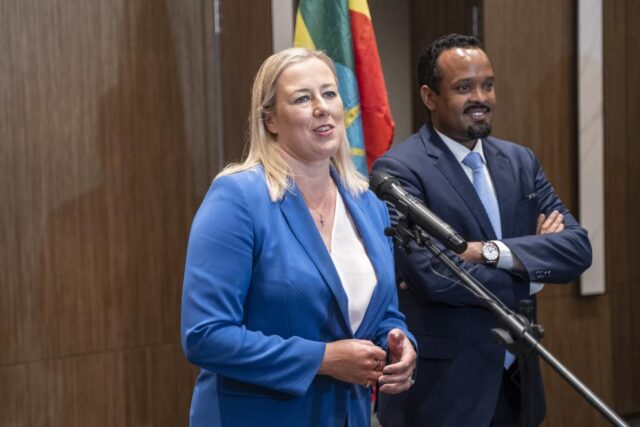The European Commissioner for International Partnerships, Jutta Urpilainen, embarked on a significant visit to Ethiopia today, marking the launch of the European Union’s Multiannual Indicative Programme (MIP) for the period 2024 – 2027. In a collaborative effort with Ethiopia’s Minister for Finance, Ahmed Shide, Commissioner Urpilainen unveiled the MIP, designed to fortify bilateral relations and promote mutual cooperation. Under the EU’s Global Gateway investment strategy, the MIP outlines three critical priority areas for cooperation: the Green Deal, Human Development, and Governance and Peacebuilding. The initiative represents a substantial financial commitment of €650 million from the EU, aimed at supporting Ethiopia’s development and stability.
Commissioner Urpilainen emphasized the EU’s commitment to Ethiopia, stating, “As a key regional partner, the EU attaches great importance to its cooperation with Ethiopia. Today, Ethiopia is engaged in a peace process, transitional justice, and reform. The European Union has consistently supported these tracks, and my presence today in Addis demonstrates the importance of these efforts. Together, the EU and Ethiopia aim to gradually normalize relations through structured political dialogue and rebuild a mutually reinforcing partnership. Under the Global Gateway investment strategy, this Multiannual Indicative Programme for 2024-2027 reaffirms the EU’s readiness to mobilize resources for Ethiopia’s stability, post-conflict reconstruction, and macro-economic recovery.”
The EU’s support is structured around three main areas:
1. Green Deal (€260 million): This priority aims to support policies and structural reforms that will stimulate innovative financing and private sector investments to advance Ethiopia’s green transition. The focus will be on sustainable development and environmental conservation.
2. Human Development (€228 million): In this sector, the EU will build on and expand aid provided for essential needs and services in response to the conflict situation in 2021-2022. It will concentrate on the reconstruction and delivery of key basic services to the Ethiopian population, enhancing education, healthcare, and social services.
3.Governance and Peacebuilding (€156 million): This area encompasses three sectors: Economic Governance, which focuses on transitioning to a private sector-led and investment-friendly economy; Democratic Governance, promoting democracy, the rule of law, and human rights; and Peacebuilding, which concentrates on inclusive actions that promote social cohesion, trust, and a culture of mutual respect and dialogue.
To ensure the effective implementation of the MIP, an active political and policy dialogue between the EU and the Government of Ethiopia is crucial. This dialogue will provide a framework for genuine exchanges on shared political, policy, and multilateral agendas. Depending on continued progress, the EU’s partnership will expand its support to national policies aimed at stabilizing and improving Ethiopia’s overall economic, financial, and trade perspectives. Based on a sustained implementation of the Cessation of Hostilities Agreement (CoHA), the EU will progressively return to a full and strengthened Strategic Engagement with Ethiopia, reinvigorating political dialogue at all appropriate levels with the Government of Ethiopia and relaunching sectoral dialogues.
The launch of the Multiannual Indicative Programme for 2024 – 2027 reaffirms the European Union’s commitment to fostering positive relations and providing substantial support to Ethiopia’s development and stability. It marks a crucial milestone in the ongoing partnership between the EU and Ethiopia, one that is expected to bring about transformative and inclusive progress in the years ahead.









